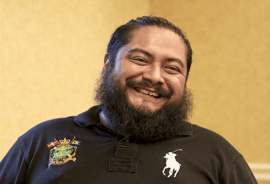
Education
Serving Diverse Stroke Populations
Eliminating Barriers to Recovery by Meeting Social Determinants of Health Needs
By: Lauren Sheehan, OTD, OTR/L
Recent advancements in treatments for stroke and improvements in overall systems of care have been instrumental in combating the increased incidence of stroke, which has moved from the third to the fifth leading cause of death in the United States¹. Despite these advancements, stroke remains a leading cause of adult disability. In addition, stroke survivors often demonstrate reduced compliance with the optimal plan of care due to shorter stays in acute care, hospital staffing shortages, and limited discharge planning resources².
 The process is further complicated by the unique needs of an individual post-stroke, including stroke-related impairments, reduced retention of hospital discharge education for stroke survivors and care partners, and social determinants of health (SDOH) inequities that present challenges to accessing care. SDOH are known to be a risk factor in post-acute stroke recovery. SDOH have been demonstrated to put individuals at higher risk for 90-day mortality and rehospitalization³. Additionally, unmet health-related social needs, such as food insecurity and inadequate or unstable housing, may increase the risk of developing chronic conditions, reduce an individual’s ability to manage these conditions, increase health care costs, and lead to avoidable health care utilization⁴.
The process is further complicated by the unique needs of an individual post-stroke, including stroke-related impairments, reduced retention of hospital discharge education for stroke survivors and care partners, and social determinants of health (SDOH) inequities that present challenges to accessing care. SDOH are known to be a risk factor in post-acute stroke recovery. SDOH have been demonstrated to put individuals at higher risk for 90-day mortality and rehospitalization³. Additionally, unmet health-related social needs, such as food insecurity and inadequate or unstable housing, may increase the risk of developing chronic conditions, reduce an individual’s ability to manage these conditions, increase health care costs, and lead to avoidable health care utilization⁴.
Acknowledging and reducing barriers to recovery, such as SDOH, can support a smooth transition to home health or outpatient therapies for stroke survivors while promoting connection through community resources and encouraging post-discharge follow-up care with primary and specialty providers.
Managing Social Determinants of Health
Kandu Health provides tech-enabled healthcare services for people recovering from a stroke. Kandu’s Clinical Navigators assess both the impairments and SDOH needs of survivors and work together with them to prioritize their needs in the post-acute phase of recovery. Kandu's integrated solution includes post-acute healthcare navigation, social needs support, and health behavior change approaches. This comprehensive service has demonstrated strong outcomes with respect to survivor functional independence, quality of life and compliance with discharge plans.
Listen to Melanie Winters, LCSW explain how Kandu's telehealth-based program can support survivors with varying social needs post-stroke.
 Based on our experience in the post-acute stroke navigation space, we know that there are often complex dynamics at play as a part of a survivor and care partner’s recovery journey. Of the (n=50) Kandu graduates that were included in this cohort study, 58% had at least one SDOH need and 24% had 5 or more SDOH needs5.
Based on our experience in the post-acute stroke navigation space, we know that there are often complex dynamics at play as a part of a survivor and care partner’s recovery journey. Of the (n=50) Kandu graduates that were included in this cohort study, 58% had at least one SDOH need and 24% had 5 or more SDOH needs5.
Among the most frequent SDOH identified were Mental Health (32%), Financial Strain (26%), and Transportation (20%)5. The greater the number of SDOH identified for a survivor, the greater amount of time that was needed for 1:1 Navigator support. This tailored navigation approach and dedicated support time is important to meet the complex needs of stroke survivors after hospital discharge. This research was first presented at the 2024 International Stroke Conference as a Nursing Conference Poster. You may access an electronic version of the poster by clicking below.
Opportunity to Improve Patient Outcomes
The ongoing relationship and trust building between survivors and their clinical navigator were elements of program success. Kandu Navigators employed strategies to address limitations that inhibit survivors from progressing between functional levels, working together with the survivor to create a recovery roadmap tailored to each patients' individual circumstances, impairments, and SDOH needs.
Kandu created a case study comparing the support provided to two different patients and the outcomes they achieved. Bob, a former film producer, and Tony, a professional chef, presented significantly different challenges after their stroke. From navigating the insurance landscape to securing proper medication and outpatient rehab, click below below to explore our case study, "Serving Diverse Social Determinants of Health Populations through a Remote Stroke Recovery Platform".
 "Being able to get resources, even something as simple as food, was helpful because it was one less thing I had to worry about, which let me focus on what was important– my recovery."
"Being able to get resources, even something as simple as food, was helpful because it was one less thing I had to worry about, which let me focus on what was important– my recovery."Tony, Stroke Survivor & Kandu Program Graduate
Citations
-
Reduce stroke deaths — HDS‑03 - Healthy People 2030 | health.gov. (n.d.).
https://health.gov/healthypeople/objectives-and-data/browse-objectives/heart-disease-and-stroke/reduce-stroke-deaths-hds-03 -
Camicia, M., Lutz, B., Summers, D., Klassman, L., & Vaughn, S. (2021). Nursing’s role in successful stroke care transitions across the continuum: from acute care into the community. Stroke, 52(12). https://doi.org/10.1161/strokeaha.121.03393
-
Reshetnyak, E., Ntamatungiro, M., Pinheiro, L. C., Howard, V. J., Carson, A. P., Martin, K., & Safford, M. M. (2020). Impact of multiple social determinants of health on incident stroke. Stroke, 51(8), 2445–2453. https://doi.org/10.1161/strokeaha.120.028530
-
Accountable Health Communities Model | CMS. (2017, May 1). https://www.cms.gov/priorities/innovation/innovation-models/ahcm
-
Winters, M, and Sheehan, L. (2024 February 6). Can a Remote Telehealth Program Support Survivors with Varying Social Needs Post Stroke? [Poster Presentation]. 2024 International Stroke Conference – Nursing Pre-Conference, Phoenix, AZ, United States. https://events.kanduhealth.com/isc2024#C
Lauren Sheehan, OTD, OTR/L is the Senior Director of Clinical Services at Kandu Health, based in Campbell, CA
8064.732.M





